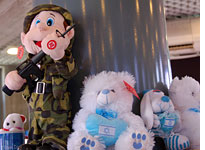A Terror Tour of Israel
The country had even gone a year without a single suicide bombing, but our garrulous taxi driver was complaining as he drove us from the Ben-Gurion airport to the Sheraton hotel in Jerusalem. "Now, it's mostly religious travelers—evangelical Christians and religious Jews," he said.
True to the driver's word, we arrived at the Sheraton to find the lobby crowded with Orthodox Jews celebrating the Sabbath. We had arrived in Israel neither as religious pilgrims nor as traditional tourists: We had signed up for the Ultimate Counter-Terrorism Mission, a weeklong journey around the country during which we would learn about Israel's battle with terrorism. The trip was aimed at U.S. police officers and homeland-security professionals.
For Israel's tourism industry, the new millennium has not been kind. In 2000—what should have been a banner year for tourism and pilgrimages—the number of visitors to the Promised Land plummeted. The Second Intifada kicked off after the failure of the Oslo negotiations and former Prime Minister Ariel Sharon's visit to the Temple Mount, keeping most tourists away. In an even worse signal to visitors, Israel's minister of tourism, Rehavam Zeevi, was shot dead by Palestinians in October 2001. While the people with fanny packs began trickling back between 2003 and 2005, a series of suicide bombings and rocket attacks kept most casual tourists away. Then came the 2006 war in Lebanon, and the Israeli tourism industry tanked again.
So, what can a country do when its tourist industry is eclipsed by terrorism? The answer, it seems, is to market terrorism to tourists. In perhaps one of the strangest twists of Middle East politics, terrorism is being used to lure visitors back to Israel. Our itinerary—which promised participants such highlights as an "observation of a security trial of Hamas terrorists" and briefings on "the realities of Israel's policy of targeted killings"—was not, at first glance, for the casual visitor. But in a way, it was. Israel has a long tradition of combining tourism and lobbying. Most famously, former Israeli Prime Minister Ariel Sharon gave a helicopter tour to George W. Bush during his 1998 trip to Israel while Bush was still governor of Texas. The two hit it off, and the visit is widely credited with reinforcing Bush's sympathy for Israel's security situation.
Who goes on a terror tour? At the bar on the first evening at the hotel, we sat next to George and Joan Kessel, a retired couple from Boca Raton, Fla., who were trying—with little success—to tell the bartender how to mix a Gibson. "We just finished a mission at Technion University," said Joan, a stylishly dressed woman with her silver hair cut in a modern bob. "That one was really good."
We had never heard of the term mission, but we soon learned it is a generic word associated with organized trips to Israel. Typically, the trips—often aimed at Jewish Americans—are meant to educate the visitors on some aspects of Israeli politics or culture. In a sense, the Ultimate Counter-Terrorism Mission, rather than an aberration, is the logical extension of what Israel has done for decades: bring over Jewish Americans and other potential supporters in the hopes of demonstrating how vulnerable the country is to internal and external threats.
"We started organizing this a few years ago when tourism dropped off," said Avi Leitner, a lawyer with Shurat HaDin Israel Law Center, an Israeli organization that sues terrorist organizations and countries on behalf of victims of terror attacks. But this year's tour was different; previous trips organized by Shurat HaDin were aimed at the regular tourist, featuring evening cruises, cookouts, and "luxurious bus transportation." This year's tour, organized with a Long Island-based homeland-security firm, Shaneson Consulting Group, was aimed primarily at law enforcement.
Our group was what could only be described as eclectic. While police officers, for whom the tour was tailored, dominated the group, we also had the Kessels, a homeland-security contractor, a former dentist, a retired ophthalmologist, and two bounty hunters. Perhaps the most famous of our tour companions was Richard Marcinko, the pony-tailed ex-Navy SEAL turned best-selling writer who was there as part of his security business, Red Cell International. For the next week we would travel around Israel, including parts of the West Bank, in a massive tour bus, with a sign clearly marked "Ultimate Counter-Terrorism Mission" on the windshield—something that elicited more than a few snickers from the security-conscious members of the group.
If Israel has not always been able to convince the world of its righteousness, it has been particularly adept at marketing its image abroad as a military powerhouse with superior technology. Israeli armaments manufacturer Rafael likes to advertise "60 years of experience in the war on terrorism." Even Krav Maga, the martial arts form taught to Israeli soldiers, has found sweeping success in the United States with aerobics buffs. That image—partially dented by the failures of the Second Lebanon War —was on display throughout the tour. Indeed, part of the idea of the tour was to market Israeli hardware such as the Corner Shot, a gun mount with a video monitor that allows assault teams to shoot around corners. But even the souvenir shops displayed the fetishization of the Israeli military. The shops were filled with T-shirts featuring military slogans ("Guns 'n' Moses"; "America, don't worry—Israel is behind you"). Our favorite souvenir was for sale at the gift shop of the Latrun military base: an IDF doll that played "We Will Rock You."
The days were packed full of visits to military bases, security briefings from members of Mossad and Shin Bet, and stops for fine dining. In the evenings, we had additional lectures that gave us a James Bond image of Israeli operations. In an evening lecture at the hotel, Oren Ben-Lulu, a veteran of Duvdevan, an Israeli commando unit that specializes in undercover work, described the intricate charades these units stage to arrest their suspects. Commandos would go into the West Bank disguised as Palestinians, sometimes even working in drag. Ben-Lulu, who stood more than 6 feet tall, joked that the "younger, better-looking guys" are assigned this job. Duvdevan even employs a well-known Israeli makeup artist to help.
Ben-Lulu, who is now an orthopedic surgeon, even recalled some of the more comical episodes from his career, which sounded like outtakes from La Cage aux Folles, not combat operations in an occupied territory—for instance, snatching a suspect at a wedding. "After the second wedding, we stopped doing it, because it's not very nice," he said. "You are ruining their wedding, actually."
Funerals, he said, were still fair game.
The whole point of this tour was to sell the Israeli model of counterterrorism. But as skilled as the Israelis are at this, it's hard to imagine U.S. troops dressing in drag to arrest terror suspects in Iraq. Perhaps when the United States gets to that point, it'll mean it has been there too long. Yet Israel, which finished 2007 without a single suicide bombing originating in the West Bank (and only one from Gaza), was claiming at least partial success. So, is it something worth emulating?
As we boarded the bus in the afternoon of our first day, Yossi Maimon, our tour guide, made an announcement. Ninety minutes earlier there had been a bombing in Dimona, Israel's first suicide attack of the year.

